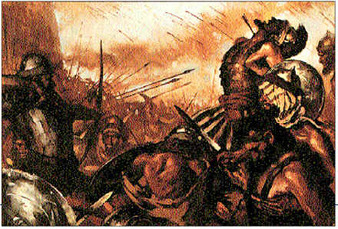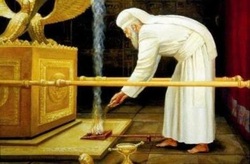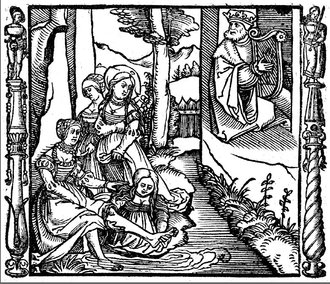Sometimes Reaping Takes a Lifetime
by Jeremy Chance Springfield
The life of David is one filled with romance, intrigue, and amazing adventure. He lived a most unique experience – of this there is no doubt. Killing a giant with a small stone, deceiving your sworn enemies into thinking you’re their friend, becoming the king of the chosen people of the Most High – just moments in the unforgettable story of his life! On top of all these things he did stood his devotion and love for the Creator. He is said to have been what the Most High was seeking; a man after Yah’s heart (1st Samuel 13:14). Furthermore, it is said in four other places how pure were his ways and heart before the Most High (1st Kings 9:4; 11:4, 8; 15:3).
One passage of praise, however, recorded in 1st Kings 15:5, includes an exception that is entirely worth noting, and is the basis for the focus of this study:

Because David performed what was upright in the eyes of YHWH, and did not stray from everything which He commanded him all the days of his life, except in the matter of UriYah the Hitti.
Such a glaring indictment against an otherwise flawless record of praise for David in the Word. The matter concerning UriYah is singled out as the one thing that David did in his life that was not upright and was an intentional straying from what he had been commanded to do. This account is well-known to most, being the grievous sin of adultery David committed with Bathsheba, and the subsequent murder of her husband by David’s personal decree. It is a horrific account of lust, betrayal, and wicked plotting that truly runs as a scar through David’s life. I will not quote the entire account in this short space, but should the reader want to refresh their memory of how it all happened, the story itself can be read in the passages from 2nd Samuel 11:1 – 12:24. I will, however, point out one verse from the midst of this account that is extremely important to note, found in 12:10, which says:
And now, the sword shall not depart from your house unto forever, on account that you despised Me, and you took the wife of UriYah the Hitti to be a wife for yourself.
This is a grim and horrible prophecy spoken by the Holy One through the mouth of the prophet Nathan to David. Due to David’s sin of adultery and murder, there would be a sword, which is to say, the threat of no peace, upon his house. He surely had no idea the dire consequences of his sins when he began them. The weight of our crimes are so often not perceived while we commit them, but only realized in the fallout that touches everyone around us. That is the power of sin – the death that it yields appears greater than the crime, and yet, it is just and equitable outcome for our rebellion. He stole another man’s wife, ordered her husband to be put into a situation that would ensure his death, and then took that woman as his own wife. The consequences for this sin involved the child conceived between David and Bathsheba dying before he could ever even enter the covenant with Yah. It involved events being set into motion that would reverberate throughout his life and the lives of his family for many years after.
This brings us to a point much later in David’s life, when he had multiple heirs to the throne, among who was Absalom, the third-born of David’s sons, not counting his son born to Bathsheba, who died as an infant. Absalom, through intense craftiness and deceit, began to win the hearts of the people of the land, to such a point that David and his house fled the throne, giving it up without contest to his conniving son. In his exile, we note a unique response in 2nd Samuel 15:31 from David when he is given a curious piece of news about someone who was part of Absalom’s band of supporters:
And now, the sword shall not depart from your house unto forever, on account that you despised Me, and you took the wife of UriYah the Hitti to be a wife for yourself.
This is a grim and horrible prophecy spoken by the Holy One through the mouth of the prophet Nathan to David. Due to David’s sin of adultery and murder, there would be a sword, which is to say, the threat of no peace, upon his house. He surely had no idea the dire consequences of his sins when he began them. The weight of our crimes are so often not perceived while we commit them, but only realized in the fallout that touches everyone around us. That is the power of sin – the death that it yields appears greater than the crime, and yet, it is just and equitable outcome for our rebellion. He stole another man’s wife, ordered her husband to be put into a situation that would ensure his death, and then took that woman as his own wife. The consequences for this sin involved the child conceived between David and Bathsheba dying before he could ever even enter the covenant with Yah. It involved events being set into motion that would reverberate throughout his life and the lives of his family for many years after.
This brings us to a point much later in David’s life, when he had multiple heirs to the throne, among who was Absalom, the third-born of David’s sons, not counting his son born to Bathsheba, who died as an infant. Absalom, through intense craftiness and deceit, began to win the hearts of the people of the land, to such a point that David and his house fled the throne, giving it up without contest to his conniving son. In his exile, we note a unique response in 2nd Samuel 15:31 from David when he is given a curious piece of news about someone who was part of Absalom’s band of supporters:

And it was told to David, saying, “Ahithophel is in the group with Absalom!” And David said, “Make foolish the advice of Ahithophel, I beg, YHWH!!”
For what reason would Ahithophel’s presence with Absalom be of any great significance to David? He certainly seems rather disconcerted at the mere mention of this reality. The beginning of the answer is listed in passing further back in the same chapter from whence comes the above quote, in verse 12, which tells us that Ahithophel was an advisor to King David. Ahithophel was a counselor to David – so what? Certainly the king would have had several advisors whose words he could weigh and so judge wisely. Why the urgent plea for divine intervention concerning Ahithophel’s advice to Absalom? For that answer, we turn to the last words of 2nd Samuel chapter 16, in verse 23:

And the advice of Ahithophel which he advised in those days was as if a man had inquired at the Speaking Place of Elohim. Thus was all the advice of Ahithophel with David and with Absalom.
This passage illuminates the amazing counsel given by Ahithophel to David and Absalom. He had the strong reputation of only giving the wisest, most righteous and true advice to the king. If his advice paralleled that of a High Priest's inquiry of Yah at the Holy of Holies, to which the term “The Speaking Place” is referring, then it goes without saying that people listened and obeyed whatever he suggested be done.
David knew this, and knew that Ahithophel was a giver of solid and powerful advice, and that no man in his right mind would think to disobey the counsel given by him. For this reason, he begged of YHWH to make Ahithophel’s advice foolish. He sought a miracle of the bending of the will of a man to bring about a thwarting of whatever plans he might dream up! This is a very astonishing fact to consider; David asked for the will and understanding of the man he trusted the most to be overcome with foolishness, because he knew that nothing less than that would work to keep him from giving sound advice to Absalom. What an amazing thought to consider.
Knowing this, the counsel that is given by Ahithophel to Absalom is of great note. It should be made clear that it doesn’t appear from the way the account plays out that the Most High listened to David’s prayer in this matter (He does thwart further advice given by Ahithophel, but his initial counsel is followed to the T). We see that a heinous and diabolical counsel is given by Ahithophel to Absalom, which is actually laid forth in the verses that precede the explanation of Ahithophel’s trusted counsel to David and Absalom, given in 2nd Samuel 16:20-22, which reads:
Knowing this, the counsel that is given by Ahithophel to Absalom is of great note. It should be made clear that it doesn’t appear from the way the account plays out that the Most High listened to David’s prayer in this matter (He does thwart further advice given by Ahithophel, but his initial counsel is followed to the T). We see that a heinous and diabolical counsel is given by Ahithophel to Absalom, which is actually laid forth in the verses that precede the explanation of Ahithophel’s trusted counsel to David and Absalom, given in 2nd Samuel 16:20-22, which reads:

And Absalom said to Ahithophel, “Do give your advice; what shall we do?” And Ahithophel said to Absalom, “Go unto the concubines of your father, whom he left to guard the house, and all Israel shall hear that you shall loathe your father, and the hands of all which are with you shall be strengthened.” So they spread Absalom a tent upon the rooftop, and Absalom went unto the concubines of his father before the eyes of all Israel.
The advice of Ahithophel is scathing and meant to cut as deeply as possible into what is left of the house of David. His counsel, while undeniably foolish in the sense of what is right, is intensely cunning when taken in regards to what it was able to accomplish for Absalom. It is appalling to think that a man so lauded as giving counsel that was seen as on par with that from the personal Presence of the Most High could give such debauched advice. Why would one who had been the giver of solid, wise counsel turn on David in such a heinous way?
Surprisingly, the answer to this question highlights the entire purpose of this study; to see that we reap what we have sown, and sometimes, if the mercy of the Most High is not immediately bestowed upon our actions, we might feel the effects of that sowing many years later. To explain how all this fits into the obscene advice given by Ahithophel that formed the nucleus of his rebellion as David’s trusted counselor, we must look ahead in the book, to a cumbersome list containing the names of David’s mighty men; those ruffians who pledged their swords boldly in fealty to the king. It is in 2nd Samuel 23:34, among the list of names, that we see a familiar one in a curious manner:
…Eliam the son of Ahithophel…
One of David’s mighty men was the son of Ahithophel! Interesting bit of trivia, perhaps, but how does that factor into all of the sowing/reaping concepts in relation to the story at hand? One further piece of information should not be overlooked at this point, which is found just a few verses later in the same chapter, in 23:39, where the last name to be mentioned in the list of David’s mighty men is that of UriYah the Hitti, the man whose demise David orchestrated in order to hide the adultery with his wife! It cannot be ignored that UriYah and Eliam, the son of Ahithophel, were fellows who had similarly pledged themselves to David. While one might not precisely be able to determine how close the two men were when it comes to being friends, there is yet an astounding link between them that brings everything together and shows exactly why Ahithophel acted as he did towards David when he betrayed him to advise Absalom with his bawdry counsel, and this connection is found only by going way back to 2nd Samuel 11:3, which tells us this unassuming piece of information, and yet allows everything to fall soundly into place:

And David sent, and he enquired of the woman. And one said, “Is this not Bathsheba, daughter of Eliam, the wife of UriYah the Hitti?”
And thus, all the pieces fit seamlessly. Ahithophel was the grandfather of Bathsheba, and his son was a fellow soldier with her husband. He would certainly have known of the events surrounding the death of her honorable husband, of the shaming of his granddaughter before all Israel, of the untimely death of his great-grandson, and how it was all apparently forgotten and swept under the rug. The Law of Yah was not carried out, which states that an adulterer and adulteress are to be executed. Instead, the king took her as his wife, and nothing more was asked of him. Finally, a generation had passed, and another son of David had ascended the throne, a son who had no affection towards his aging father. This was the moment where all his years of counsel could be used finally in vengeance.
Notice well that Ahithophel’s first counsel to Absalom is the undeniable shaming of David through sexual procurement of the women who, in that society, rightly belonged solely to his father. This is an outright reprisal for what David did to UriYah, the husband of Bathsheba, Ahithophel’s granddaughter. The nature of the counsel is so purposely calculated and cruel that there can be no doubt as to the reason for it once the link to Bathsheba is established. Ahithophel was used as a divine instrument causing David to reap what he had sown, even if it were so many years down the road. His vindictive counsel was successful.
However, as mentioned briefly before, his second advice was immediately thwarted and seen as foolish in the eyes of Absalom. It involved a swift and brutal attack upon David’s exiled group with the intention of killing the shepherd-turned-king, but was ignored in favor of a second suggestion. When his counsel was denied by Absalom before all in his courts, Ahithophel could not handle the dashing of the hopes of his revenge, and instead, bitterly took his own life. Absalom’s life ended in a similar tragic situation not long after, and David was, at last, restored to his place as the king of Israel.
The lessons that can be learned from this account and a proper understanding of it are numerous. The fire of lust can burn out of control so quickly. The maze of lies can easily entrap us. The trust of others can be used to their harm – even destruction. Our actions can have both immediate and long-term consequences. The effects of our sins can oft-times reach far beyond what we ever thought them able. And the list goes on…
When Scripture says that David followed Yah with a perfect heart in all his ways, this is to be rightly commended. It is a beautiful thing to which we should all aspire. However, when it tells us that in one thing only he strayed from the path, we should just as soberly consider what that meant for him, his family, and those affected by his choices. In like manner, our own choices have the potential to bear fruit that we would never wish to reap. May we all sow carefully and with wisdom.
All study contents Copyright Jeremy Chance Springfield, except for graphics and images, which are Copyright their respective creators.